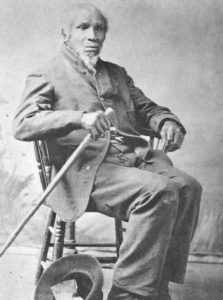
Stephen Bonga
*The birth of Stephen Bonga is celebrated on this date in 1799. He was a Black Ojibwe fur trader, clerk, and interpreter.
Stephen Bonga was born at Park Point, opposite Wisconsin Point in Canal Park, Duluth, Minnesota. He was the son of Pierre Bonga and his Ojibwe wife and the grandson of Jean and Jeannie Bonga, who were slaves at Michilimackinac. His grandparents belonged to a British officer commanding Mackinac Island in the 1780s. Freed in 1787, Jean and Jeanne Bonga began a family.
Their son, Pierre Bonga, worked in the fur trade for the Northwest Company and later for the American Fur Company. Pierre married into the Ojibway tribe and fathered four children, all participating in the fur trade. Stephen Bonga often made the confusing boast of being “the first white child born at the Head of the Lakes,” the region near the present-day cities of Duluth, Minnesota, and Superior, Wisconsin.
As a young man, he was sent away for an education to become a Presbyterian missionary. However, he quit school and returned to Lake Superior, where he married an Ojibway woman and entered the fur trade as an interpreter. With his brother George, he spent the Winter of 1823-1824 with an American Fur Company party at a post named “Fort Misery” near the present location of Grand Portage National Monument. Promoted to a clerk, Bonga advanced in the fur trade hierarchy. He traded for the company in the border lakes region of northern Minnesota and western Ontario between 1827 and 1833.
As a clerk, Bonga frequently traveled through the waterways that would later become Voyageurs National Park. He traveled widely during his lifetime and canoed on Lake Superior and many of the waterways of the western Great Lakes region, including the area that would later become the St. Croix National Scenic Riverway. He was also on the Death March to Sandy Lake in the 1850s, and on the Sandy Lake Annuity, Role was listed #79 with the Fond du Lac Band.
In later life, after he left the fur trade, he served as a guide and interpreter for artist Eastman Johnson. He accompanied Johnson during his Lake Superior travels to the areas of present-day Grand Portage National Monument, Apostle Islands National Monument, and Isle Royale National Park, where the artist sought subjects to paint. Stephen Bonga died in 1884 near his birthplace. He was a respected black member of both the American Indian and non-native communities of the Minnesota-Wisconsin border region.
Image courtesy Ray ‘Duke’ Wolf of the Lac Courte Oreilles (LCO) Tribe.